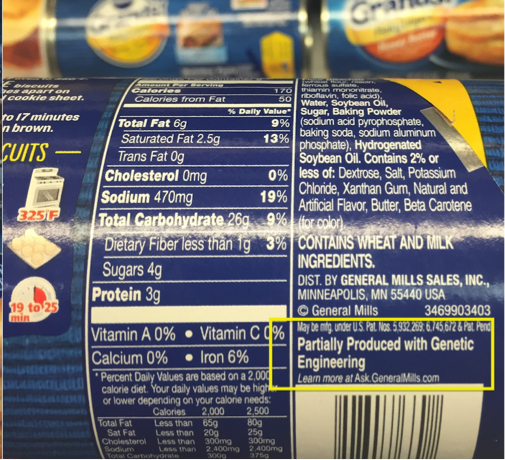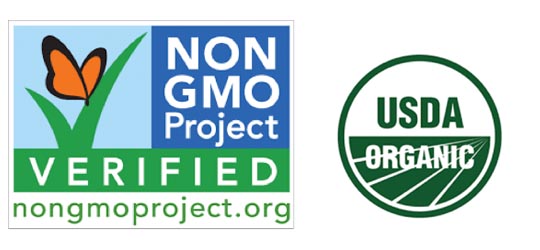
Obama Signs Discriminatory GMO Bill
- Obama shows preference to Big Ag over the American people. Find out how it will affect you…
- If you care about what’s in your food, get ready to upgrade your cellphone plan
- Two labels to look for in these times of undisclosed ingredients.
Dear Living Well Daily Reader,
President Obama checked one more thing off his leaving-the-White House-soon to-do list last week: clear discrimination against millions of Americans.
He signed a bill that not only breaks a promise he made to voters in 2007 — you know, the one where he promised to “let folks know whether their food has been genetically modified because Americans should know what they are buying” — but also manages to marginalize over 100 million Americans and strip away the GMO labeling rights of all 50 states.
You see, President Obama signed S. 764, otherwise known as the DARK Act, or the “Denying Americans the Right to Know Act,” into law.
And while this bill will allegedly “establish a national disclosure standard mandatory bioengineered foods,” it seems it may do just the opposite.
If you’ve been following this dastardly bill’s progress through the Senate and House, then you may already know that this bill brings with it endless consequences for Americans who want to know what they are eating. Some of these include confusing and inaccessible labels, the reversal of existing state GMO labeling laws and could negate the clear labeling some companies like Campbell’s and General Mills have opted for.
Now that the bill is the law, it will keep millions of Americans from knowing what’s in their food.
![]() Ingredient Information: Now Only for Those With a Data Plan
Ingredient Information: Now Only for Those With a Data Plan
This bill allows companies to forgo any clear GMO labeling they’re already using on their packaging, such as the one below:

Source: The Consumerist
Instead, companies can replace it with vague ingredient information about their products like website addresses, QR codes, text replies and 1-800 numbers.
But the real issue here is that these codes require consumers to have access to cellular phones, the internet and sometimes both in order to get to the food information they are seeking.
For some folks, this may not seem like such a big deal (if you’re reading this on your smartphone, that may include you), but for over 100 million Americans, this bill is blatant discrimination.
The U.S. government is making it legal for Big Food to discriminate against those who can’t afford this technology, don’t understand how to use it or don’t wish to use it.
I will admit, even the clear GMO labels like the one on the biscuits above aren’t perfect.
There are millions of folks in this country who aren’t able to read, read print that small or read English. This means that even with the clearly worded GMO labeling that’s already in place, there are plenty of people unable to decipher if they are purchasing genetically modified foods.
However, even with their flaws, these labels are much easier to navigate and more affordable than the cellular contract you’ll have to sign to access the ingredient information of the future.
But most upsetting — the government could’ve made a simple symbol-based label, like Brazil’s transgenic label. This easy-to-understand label is added to any food with 1 percent or more genetically modified ingredients.

Source: Library of Congress
Pretty simple, right? No reading, scanning, calling or texting. If you see the symbol, you know your food contains GM ingredients.
Instead, the U.S. government has chosen to take the low road. Not only are they deliberately hiding vital food information from Americans — an act of discrimination no matter what your situation is — they’re also lending a hand to the companies that are feeding you toxins.
What’s next? We will all have to run out and buy iPads in order to vote?
![]() Kiss Your States’ Rights Goodbye
Kiss Your States’ Rights Goodbye
To make a bad situation worse, this new law also negates the sovereignty of individual states. For instance, Vermont’s recently enacted GMO labeling laws are now invalid. While this directly affects folks living in Vermont, the ripple from this bill is a huge blow to states’ rights. People choose the states they live in (and pay taxes there) to ensure they have the right to live their lives as they feel fit.
Andy Kimbrell, executive director of the Center for Food Safety, sums up all the consequences of this bill well:
I don’t know what kind of legacy the president hopes to leave, but denying one-third of Americans the right to know what is in the food they feed their families isn’t one to be proud of. This law is a sham and a shame, a rushed backroom deal that discriminates against low-income, rural, minority and elderly populations. The law also represents a major assault on the democratic decision-making of several states and erases their laws with a vague multiyear bureaucratic process specifically designed to provide less transparency to consumers.
The Department of Agriculture has two years to sort out the regulations of the bill. I’m certainly not depending on the government to implement clear labeling or require steep fines for those companies who don’t comply with the new standards.
In the meantime, the best way to avoid GMOs is to buy products with the Non-GMO Project Verified label. Products with this seal should have documentation and quality control procedures in place to help ensure that no GM ingredients are used. Look for this seal when shopping for groceries, but keep in mind that non-GMO doesn’t mean organic — non-GMO foods may be grown with pesticides and herbicides.

One other label to look for is the USDA Organic seal. All certified organic foods are produced without any genetically modified ingredients. The USDA Organic seal means that the food is produced without certain pesticides, synthetic fertilizers, irradiation or genetic engineering.
To learn more about food labels if you’re already a Living Well Daily Insider, refer to your How to Survive the Supermarket report.
If you’re not an Insider yet but want to learn more about food labeling, healthy tips and tricks and other important information that will help you live well, click here.
For now, looking for one of these labels will help you avoid GMOs. In the future, if you see a QR code, web address, 1-800 number or text reply on a food’s packaging, you shouldn’t buy it.
Live well,

Natalie Moore
Managing editor, Living Well Daily
Sources
[1] As Congress dickers over GMO labeling, Brazil may offer path forward
[2] President Obama Signs GMO ‘Non-labeling’ Bill, Leaves Millions of Americans in the Dark
Written By Natalie Moore
Natalie Moore is a dedicated health researcher with a passion for finding healthy, natural, and science-based solutions. After a decade of direct healthcare experience in western and natural medicine, she was involved in public health research before joining Living Well Daily.
View More Free Articles
This Sleep Mistake Is Doubling Your Disease Risk
Think your inconsistent bedtime is just a harmless habit? Think again. New research reveals that going to bed at different times each night isn’t just making you tired—it could be dramatically increasing your risk of serious diseases. But the key to making sure poor sleep doesn’t derail your health goals likely isn’t what you think…....
Stop Obsessing Over Diet Trends
Can we stop with the endless diet debates already? Every other week there’s a new headline shouting about which diet is best for weight loss, heart health, or diabetes. Paleo, keto, low-carb, high-protein… it’s exhausting. And now, a new meta-analysis is out comparing the Mediterranean diet, the DASH diet, and something called AHEI (that’s “Alternative...
A New Reason to Ditch Processed Junk
If you’ve ever walked the inside aisles of your local grocery store and thought, “This is all just junk,” your instincts were spot on. A new study published in the journal Thorax just added another red flag to the list of dangers linked to ultra-processed food—a 41 percent higher risk of lung cancer. That’s right....
When Being Winded on Stairs Is Serious (And When It Isn’t)
I had an athlete visit me recently because he experienced shortness of breath while climbing stairs. He is in great shape, so he was worried about what it might mean. “Doc,” he said, “I run five miles three times a week. Why am I huffing and puffing after two flights of stairs?” His concern is...
Study EXPOSES Hidden Danger Lurking in Your Car
We think of our homes and cars as safe havens. But according to a startling new study, they may be flooding your lungs with microscopic plastic particles—every single day. Researchers in France recently found that adults inhale an average of 68,000 microplastic particles daily from indoor air alone. To put that in perspective, that’s about...
Mailbag: Is Modern Food Making You Snore?
“What can cause snoring, and is there a way to correct this issue?” —Seeking Silence Hi Seeking, Snoring happens when the soft tissues in your throat relax and vibrate as air passes through during sleep. While several factors can cause snoring—from sleep position to nasal congestion—I want to share one trigger that might surprise you....
Simple Food Swap SLASHES Dementia Risk 28%
Let’s be honest… who would jump at the chance to cut their dementia risk by 28 percent. And no, you don’t need to run marathons, survive on broccoli, or learn to play the zither (whatever that is) to make it happen. All it takes is one easy swap—something that’s probably already in your refrigerator. Researchers...
This SMART Floss Exposes Hidden Health Danger
Scientists have created dental floss that doesn’t just clean between your teeth—it also tracks your stress while you’re flossing. Now, I know what you’re thinking… “Great—now even flossing is going to stress me out by telling me how stressed I am.” But this fascinating new tool from Tufts University could be a game-changer for understanding...
Is This "Safe" Sweetener Damaging Your Brain?
The headlines are alarming… “Popular Sugar Substitute Linked to Brain Cell Damage” and “Erythritol Could Damage Critical Brain Barrier” are just two of the dozens I’ve spotted recently. But before you toss every sugar-free product in your pantry, let’s take a closer look at what this study actually shows—and what it doesn’t. The latest research...
This Summer Threat Could SPIKE Your Blood Sugar
Picture this… It’s another scorching hot summer day. You crank up the air conditioning while watching the weather forecast, which predicts yet another “record-breaking” heat wave. It’s starting to feel like just another miserably uncomfortable summer. But what you might not realize is that—if you have diabetes—those rising temps could do far more damage to...









